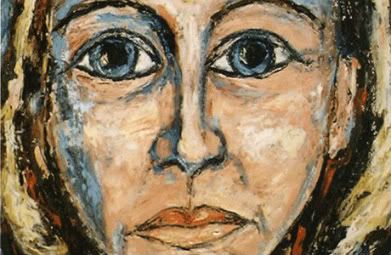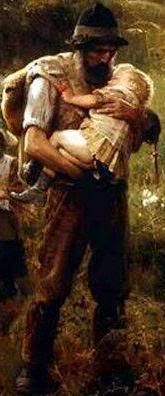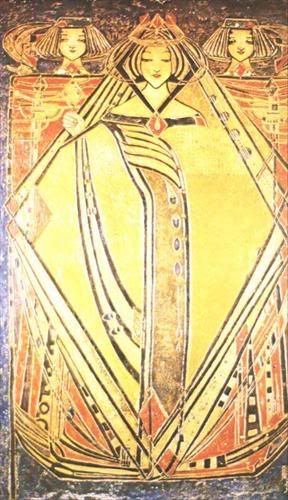Anna Kavan and the Void
by Michael Fontana

I located Anna Kavan inside the Imperial War Museum in London, once upon a time the infamous Bedlam Asylum. Anna had stayed in Bedlam, a madwoman and heroin addict. To commemorate this, the museum had placed a small plaque just inside the front doors. How appropriate it seemed to place a war museum inside an insane asylum, since war was nothing but madness anyway.
This was in 2000, after another form of madness, Y2K, had passed. Since Anna had died years earlier, she came to greet me as a ghost. She occupied the cockpit of one of the biplanes suspended from the ceiling, looking very much unlike the kind of novelist who focused with intensity on the psychic lives of her characters. Still she was beautiful, sporting goggles, a leather helmet, and a scarf that fanned behind her.
I tried to talk her down and that was about the time that the museum guard approached. “May I help you, sir?”
“I have a date with that woman.” I pointed to the plane.
“I see no woman,” the guard said without sounding the least judgmental.
“Oh, she’s there. She’s about to break her moorings and head out into the sky.” And indeed that’s what she did. The cables holding the plane in place came undone with an exquisite snap. The doors of the museum had been propped open to relieve the heat inside since the facility had no air conditioning. This allowed her to easily fly outdoors.
I ran out onto the lawn where a few couples had settled in for picnic lunches. The air smelled of bus exhaust. Had Anna found me unattractive? I was a middle-aged man with luxurious curly black hair except for one round bald spot in back. My eyes glinted like sapphires. I was athletic enough to run and keep pace with a biplane down the otherwise congested streets of London.
Even beneath the goggles and helmet she looked fetching, with her addict’s spare frame and her blonde hair cut short. I knew she was headed toward her flat although there was no place to land. This did not halt her motion. Instead she flew through an open window and landed safely on the living room floor, which bore the weight exceptionally well.
I caught up to her there. She did not remove the goggles or helmet. However, she had removed her works from a dresser drawer and was proceeding to cook up the heroin in a spoon of authentic silver. I tried to disarm her but she disarmed me instead, pinning my arm behind my back at a perfect angle for her to inject me with the needle’s contents.
A wave of nausea soon gripped me. For the rest of the afternoon I sat on the floor and nodded off, listening down into myself as if I were a penny falling down a well.
Anna joined me in this state. That was the purpose of our meeting in the first place, to take me from pure academic research into her oeuvre into the sources of her consciousness. She was kind enough to put on the kettle for tea and so we drank that as well, laden with real cream and seemingly endless scoops of sugar.
The tea and sugar kept us awake so that the nod extended longer. I grew serene the longer that we sat, shadows coming in as the sky clouded up, an intense barrage of rain soon pounding down outside, some of it slipping in through the window, which of course had no screen. After the storm passed it would stay daylight until eleven p.m.
We were not lovers so we did not kiss. It would be hard to kiss a phantom anyway. But she seemed palpable against me, leg to leg. Silence trawled the room like a net at the bottom of the ocean. Anna removed a clove cigarette from her purse and its aroma filled the air. Soon we left the flat for takeaway Chinese, the rice and noodles and bits of fish coated with soy sauce so it all burned salty in the mouth.
On rain slicked paving stones we encountered a one-eyed man who guided us into a brothel. The entire décor was a deep and bloody red, its weight inside the retina almost too much to bear. We bore it anyway, accepting proffered seats on a divan. We soon stripped naked and entered a whirlpool, then went into a sauna where an attendant in a cat suit poured cold water over coals to increase the steam.
The heat and nakedness made me impossibly dizzy. Anna held my hand, assuring me that this was just another wave in our intoxication, that if I clung to her enough it would pass and calm would be restored. The attendant returned to escort us out of sauna and back onto the divan, where we remained naked. We soon held bowls of warm rice pudding laden with sultanas and ate until our bodies slowed.
We must have slept there for hours because when I next lifted my head the sky had turned a metallic sheen of black. Up there Anna reoccupied her biplane, flying sensational loops against the backdrop of a three-quarter moon, the stars like so many instances of camera flash. I could not breathe so I lay down on the paving stones and let the water creep inside my clothes. I smoked cigarettes to ensure that I was breathing something, even if it wasn’t air.
Soon enough Anna disappeared into those said same heavens, her plane like a comet only taking the opposite trajectory, away from Earth instead of toward it. I heard myself talk to her though the words were simply nonsensical syllables strung together. Cherry double-deckers passed. Passersby rattled their fish-and-chip papers to unveil a waft of stinking cod.
I wanted to arise and join the motion but the heroin had rendered me a ghost the same way it had Anna. My hand passed through the door of a red call box when I went to ring the authorities for an ambulance. Even though I spoke it was clear that no one could hear me, or else my voice had taken on the characteristics of any common magpie in the realm, pleasant to hear but strictly background in a city of such bustle.
The sole advantage of this change in my corporeality was that I could now move more quickly down the streets as the wind picked me up and carried me as softly as a red corsage down the streets where black taxicabs sounded their horns in vexed staccato. If I looked hard enough I could see ghosts of decades-old lamplighters at their craft, holding small flames at the end of long poles to illuminate candles inside streetlamp globes.
I flew all the way back to Bedlam and the museum. Inside, suspended from the ceiling, was the biplane that Anna Kavan had taken. Only now she was absent. The severed cords had been healed and held the plane in place. The guard stood watch near the door, nodding to tourists who came to ogle the violent regalia. It was unsettling how the metal of a tank could take on such smooth luster, approximating the pure whiteness of everything that Anna ever cooked to place in her bazooka prior to driving it into the crook of her arm. It shouldn’t have surprised me that one mechanism of mass death should so approximate another, although it was also easy to see the captivation that both held over the indulger: the risk, the fear, the rush, the nearing of the void.
Michael Fontana says: My work has appeared in a variety of publications, print and virtual, including Cezanne's Carrot, SamizDada, and others. I work at a community mental health center in northwest Arkansas, USA.
Where do you get the ideas for your stories?
I usually get ideas for my stories from an initial phrase or image that sticks in my head. In this case, it was the image of Anna Kavan, a writer whom I love and is very underappreciated, being trapped in a place like Bedlam Asylum. Fantasy writers might wish to read her books Ice or Julia and the Bazooka as introductions to her work.






